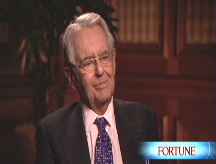Obama's opportunity costs
Campaign promises aren't free. The president-elect now has to decide what he'll sacrifice to attack our biggest problems.

(Fortune Magazine) -- As I was talking with political analyst Stuart Rothenberg the other day, he made the observation that tradeoffs are everywhere in life - except in campaigning. If you want people to vote for you, don't tell them that your inspiring vision of America entails any costs; in the campaign world, it's all gain, no pain.
For proof, look no further than the second McCain-Obama presidential debate, when a voter questioned both candidates about what they'd ask Americans to sacrifice in order to make the country greater. Neither could think of a thing.
Now it's back to the real world, and President-elect Obama must confront the tradeoffs that are inescapable in attacking the country's biggest problems. Every issue poses two kinds of tradeoffs: conflicts of principles and conflicts of constituencies. On three giant issues, here's how the tradeoffs shape up.
Here, the most immediate conflict is the need for hundreds of billions of dollars in fiscal stimulus vs. adding to the federal deficit. In theory, that shouldn't be a problem; deficit spending in bad times is balanced by the subsequent boom times. But with the national debt already huge, and the start of a Medicare disaster just a few years off, the federal budget is a major problem even before any stimulus.
The more fundamental policy conflict will be stability vs. growth. We're in this mess because financial institutions took risks they shouldn't have. Obama's team may therefore want to increase regulation of risk markets - insurance, derivatives, credit default swaps - or restrict the risks that financial institutions can take. But one of America's most powerful economic strengths is its appetite for risk. Slow that down, and the U.S. economy could ultimately be worse off, not better.
The main political tradeoff is pleasing the voters vs. pleasing the donors. America hates Wall Street right now and can't wait to see mighty financiers brought low. Trouble is, those financiers were some of Obama's most important campaign contributors; he got far more from Wall Street than McCain did. Somebody won't be happy, and Obama has to decide who.
The major health-care tradeoff is coverage vs. competition. One of the election campaign's main themes was that too many Americans don't have medical insurance or don't have enough coverage. While Obama never promised universal coverage, he proposed new requirements for insurers - to cover preexisting conditions and more services, for example.
But once you require coverage, you must also regulate prices; otherwise insurers would set prices sky-high. The trouble with all that regulation is that it constrains insurers from competing - and competition is where innovation and value come from.
A major conflict of constituencies is big vs. small employers. Big ones see health-care reform as a possible way to cut costs and reduce a competitive disadvantage in the global economy. Small employers see it as the threat of more government rules and higher costs.
The tradeoff at the policy level is cost vs. cleanliness. Policies that would reduce pollution and dependence on foreign oil (a gas tax, tax incentives for alternative energy) would increase costs for consumers or government at a time neither can afford it.
At the political level the conflicts are rampant, with oil companies, coal companies, car companies, utilities, and consumers all pushing disparate agendas. (Note that the largest player in ethanol - clearly established as an energy-efficiency loser - is Illinois-based Archer Daniels Midland (ADM, Fortune 500), one of whose core competencies has long been political influence, to put it politely. Now that an Illinois Senator is about to become president, keep an eye on ethanol subsidies and mandates.)
All those tradeoffs are hard, with powerful forces pulling each way. As we watch Obama make his policy choices on the largest national issues, it's important to notice not just what he's trying to gain, but also what he's choosing to give up. ![]()
-
 The retail giant tops the Fortune 500 for the second year in a row. Who else made the list? More
The retail giant tops the Fortune 500 for the second year in a row. Who else made the list? More -
 This group of companies is all about social networking to connect with their customers. More
This group of companies is all about social networking to connect with their customers. More -
 The fight over the cholesterol medication is keeping a generic version from hitting the market. More
The fight over the cholesterol medication is keeping a generic version from hitting the market. More -
 Bin Laden may be dead, but the terrorist group he led doesn't need his money. More
Bin Laden may be dead, but the terrorist group he led doesn't need his money. More -
 U.S. real estate might be a mess, but in other parts of the world, home prices are jumping. More
U.S. real estate might be a mess, but in other parts of the world, home prices are jumping. More -
 Libya's output is a fraction of global production, but it's crucial to the nation's economy. More
Libya's output is a fraction of global production, but it's crucial to the nation's economy. More -
 Once rates start to rise, things could get ugly fast for our neighbors to the north. More
Once rates start to rise, things could get ugly fast for our neighbors to the north. More








